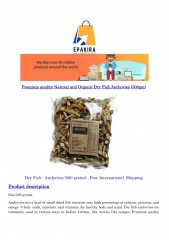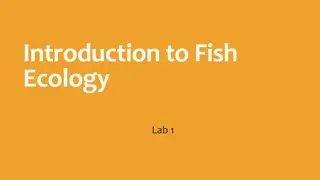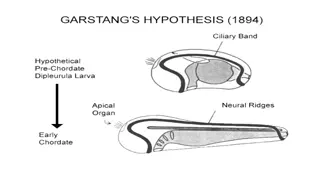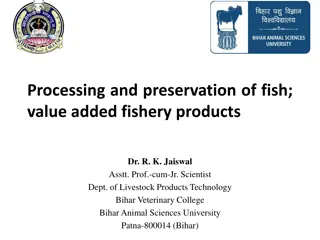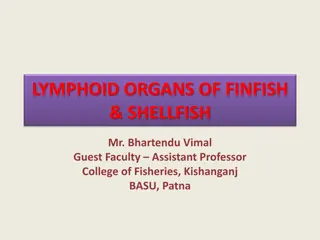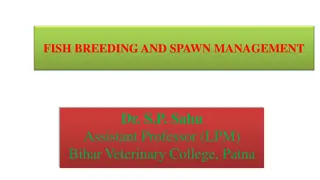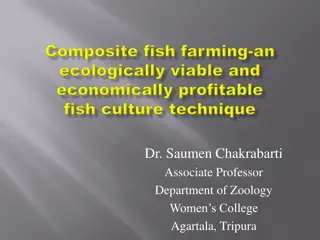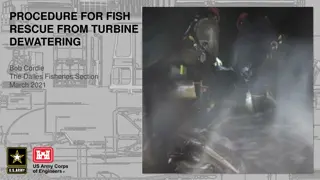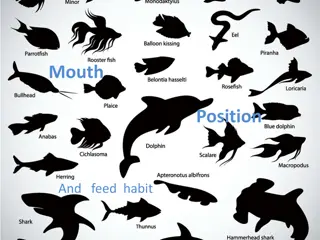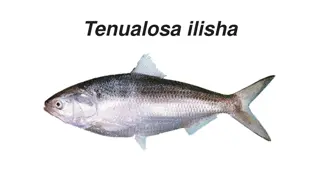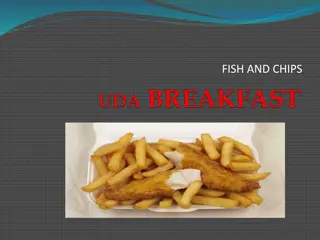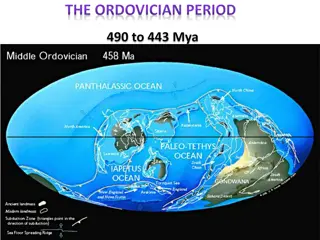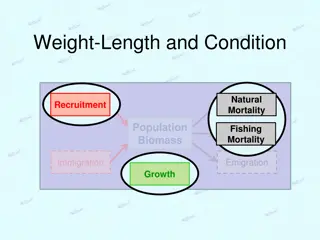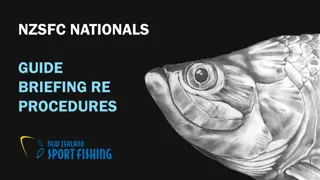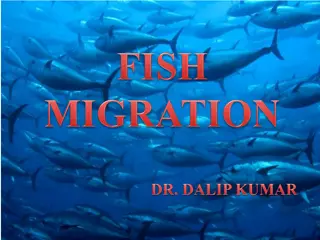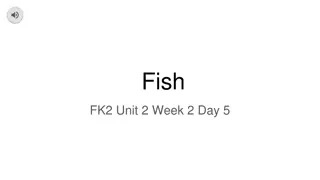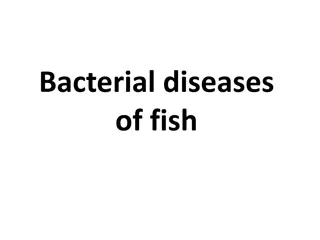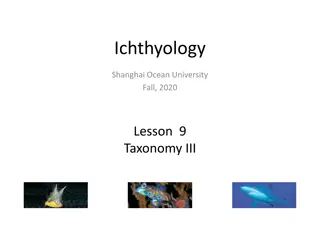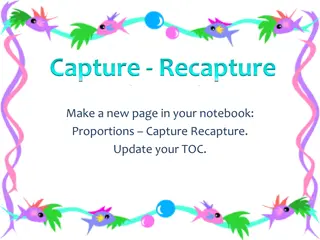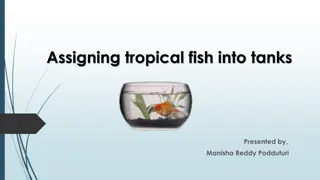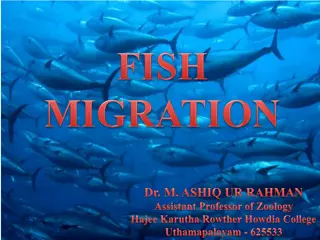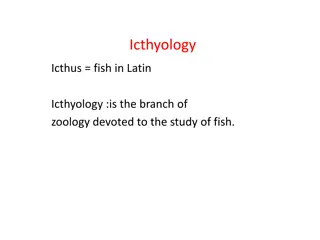Premium quality Natural and Organic Dry Fish Anchovies (500gm)
Dry Fish - Anchovies (500 grams) , free shipping worldwide\n\nProduct description\n\nSize:500 grams\n\nAnchovies are a kind of small dried fish contains very high percentage of calcium, proteins, and omega -3-fatty acids, minerals, and vitamins, for healthy body and mind. Dry fish anchovies are comm
0 views • 3 slides
Understanding the Fascinating World of Fishes: A Comprehensive Overview
Fishes, the most numerous vertebrates on Earth, exhibit incredible diversity across various groups such as Agnatha, Chondrichthyes, and Osteichthyes. From jawless Agnatha like lampreys to bony Osteichthyes including lobe-finned and ray-finned species, fishes display unique characteristics and adapta
6 views • 8 slides
Understanding Fish Ecology: Interactions, Diversity, and Environmental Factors
Fish ecology involves studying the distribution, interactions, and abundance of fish species in different ecosystems. This lab delves into the divisions of ecology, fish species diversity in marine and freshwater ecosystems, and the environmental factors affecting fish diversity and abundance. Disco
1 views • 7 slides
Overview of Agnatha: Jawless Fish in Chordata
Agnatha, the superclass of jawless fish in the phylum Chordata, includes both present (cyclostomes) and extinct species. Cyclostomes, such as lampreys and hagfishes, lack jaws and have unique adaptations. They have primitive characteristics like a circular mouth and lack of paired fins, alongside sp
1 views • 15 slides
All About Fish and Shellfish: Types and Characteristics
Explore the world of seafood with a detailed overview of fin fish, shellfish, and their various sub-categories. Learn about the characteristics of white fish, including flat and round varieties, as well as oily fish. Discover the differences between fin fish and shellfish, such as crustaceans and mo
1 views • 18 slides
Fish Processing and Preservation Methods for Quality and Longevity
Fish are highly perishable and require proper preservation techniques to maintain their quality and freshness. Methods such as chilling, freezing, and other preservation techniques are employed to extend the shelf life of fish for short and long durations. Quick freezing is preferred for long-term s
1 views • 17 slides
Overview of Fish Harvesting, Handling, and Transportation
Fish harvesting is crucial for providing valuable animal protein, with India being a key player in fish production. Fisheries are categorized into fin and non-fin types, with capture and culture fisheries being common practices. Capture fisheries involve natural species recruitment in sea and inland
2 views • 16 slides
Overview of Lymphoid Organs in Finfish and Shellfish
Lymphoid organs play a crucial role in the defense mechanisms of finfish and shellfish by generating immune cells. Different types of fish vary in their lymphoid organ structures, with jawless fish relying on lymphoid tissue within other organs for immune cell production. Cyclostomes, like hagfish a
1 views • 24 slides
Fish Breeding and Spawn Management Techniques by Dr. S.P. Sahu
Dr. S.P. Sahu, an Assistant Professor at Bihar Veterinary College in Patna, provides valuable insights into fish breeding and spawn management. The content covers fish seed collection, procurement methods, fry identification, and confined water breeding techniques. Detailed information on Indian maj
2 views • 26 slides
Composite Fish Farming: An Innovative Aquaculture Technique
Composite fish farming is a popular aquaculture technique where different compatible fish species are cultured together in ponds to maximize fish production. Researchers from India and abroad have contributed significantly to this field. The practice involves combining Indian major carps like Catla,
1 views • 19 slides
Guide to Fish Rescue from Turbine Dewatering Process
Detailed procedure for rescuing fish from turbine dewatering, including steps like hoisting sturgeon, salvaging fish in tanks, and using gantry cranes to transport them. The process involves specialized equipment and careful handling to ensure the safety of the fish. Images illustrate key steps in t
2 views • 9 slides
Enhancing Fishery Management Strategies in Indian Reservoir Fisheries
The demand for fish in India is increasing rapidly, but natural fish production from reservoirs is limited. The average fish productivity in Indian reservoirs needs to be improved to meet population demands. Strategies for fishery enhancement focus on optimizing ecosystem utilization, modifying habi
0 views • 16 slides
Understanding Fish Mouth Positions and Feeding Habits
The position of a fish's mouth reveals valuable information about its feeding habits, behavior, and lifestyle. Fish mouths can be categorized as superior (upward-facing), terminal (forward-facing), or inferior (downward-facing), each adapted for specific feeding strategies. Superior mouths are ideal
5 views • 10 slides
Understanding Routes of Drug Administration in Fish Pharmacology
Fish pharmacology is crucial for treating fish diseases effectively using drugs. Factors like water quality, pathogens, mortality rate, legal aspects, and economics need consideration. Different routes of drug administration in fish include water medication, immersion or dipping, hyperosmotic infilt
1 views • 20 slides
All You Need to Know About Hilsa Fish
Hilsa herring, also known as Hilsa shad, is a sought-after food fish in the Indian Subcontinent, particularly in Bangladesh, India, and West Bengal. This marine species belongs to the herring family, Clupeidae, and can grow up to 60cm in length. It is an anadromous fish, schooling in coastal waters
0 views • 5 slides
The History and Recipe of Fish and Chips
Fish and chips originated in England as a popular meal among the working classes during the 19th century. The dish consists of fried fish and deep-fried potato slices, traditionally served in paper wrappings. The history of fish and chips dates back to the rapid development of trawl fishing in the N
4 views • 7 slides
Studies in the Use of Algae in Fish Nutrition by Dr. Peter Perschbacher
Dr. Peter Perschbacher, an Associate Professor at the University of Arkansas, specializes in exploring the benefits of algae in fish nutrition. His research interests include polycultures, algae as fish meal replacements, alligator gar ecology, and more. He has received numerous honors and awards fo
0 views • 28 slides
Tidal Waters Fish Habitat Assessment Choptank Framework Pilot Fish GIT Meeting January 2021
The Tidal Waters Fish Habitat Assessment Choptank Framework Pilot Fish GIT Meeting held in January 2021 discussed background, drivers, and the selection of the Choptank River as a candidate tributary. The project team, responsible parties, actions, and timeline for developing an analytical framework
0 views • 17 slides
Symbolism and Beauty of Koi Fish in Asian Art
Koi fish hold special significance in Asian culture, symbolizing perseverance, strength, prosperity, and good luck. They are popular subjects in paintings due to their rich symbolism rooted in legends and traditions from countries like China and Japan. The fish's journey from carp to dragons in Chin
0 views • 13 slides
Evolutionary Insights from the Ordovician Period
The Ordovician period was marked by significant events such as the average temperature and atmospheric CO2 levels, the emergence of diverse life forms, glacial events leading to mass extinctions, and the survival of the fittest in evolving environments. Primitive reefs, major evolutionary radiation
0 views • 12 slides
Understanding Fish Condition Metrics and Length-Weight Relationships
Fish condition metrics and length-weight relationships play a crucial role in assessing the health and growth of fish populations. These metrics help determine factors such as weight relative to length and overall physical health. By utilizing models and examining relationships between length and we
0 views • 16 slides
Managing Fish Barriers in Scotland: Improving Water Environments
The management plans and implementation of fish barriers measures in Scotland aim to address key pressures on the water environment, such as fish migration, physical condition, and pollution. The initiative involves categorizing barriers, taking actions on fish migration, scoping barriers, assessing
0 views • 9 slides
Analysis of Price Links in the Fish Supply Chain
This research delves into methods for measuring price links within the fish supply chain, considering factors such as demand, marketing inputs, and price transmission. The study explores the elasticity of demand, substitution possibilities, and models to assess price and margin flexibilities in the
0 views • 24 slides
Solving the Piscatorial Percentages Problem
The "Piscatorial Percentages" problem involves a fish tank with 200 fish, 98% of which are small. By removing a certain number of small fish, the goal is to leave 96% of the total fish as small fish. Two approaches are discussed to reach the solution, resulting in the removal of 100 small fish in bo
0 views • 25 slides
NZSFC Nationals Guide - Fish Counting Procedures and Point System
Learn the detailed procedures for counting and weighing fish at the NZSFC Nationals, including point-based and weight-based scoring systems, species trophies, Varta Cup awards, and line weight requirements for different fish species. Understand the formula for calculating points based on the weight
0 views • 12 slides
Understanding Aquatic Epidemiology in Fish Populations
Aquatic epidemiology is a crucial branch of science that focuses on describing the health, diseases, and welfare of fish populations. It involves studying diseases in wild and hatchery-raised fish, identifying factors influencing disease occurrence, and conducting diagnostic investigations to mainta
0 views • 12 slides
Challenges and Solutions in Fish Truck Fleet Logistics
Addressing the complexities of managing a large and aging fish truck fleet, the challenges include maintaining safety, operational costs, fleet efficiency, and replacement timing. Solutions involve collaboration with hatchery managers, experts' advice on fleet replacement, and working with agencies
0 views • 11 slides
Understanding Immunotoxicity in Fish: An Alternative Model for Toxicological Studies
The study explores the immunotoxic effects of industrial effluents on fin fish, highlighting xenobiotics' impact on the immune system. It discusses the sensitivity of the immune system to environmental toxins and the elicitation of immune reactions by various substances. The importance of fish as a
0 views • 25 slides
Exploring Different Types of Fish: From Finfish to Shellfish
Discover the diverse world of fish, including finfish and shellfish, with insights on their structures, nutritive value, cooking uses, and market availability. Learn about the various types of fish categorized by their living environment and fat content, as well as different forms and processed prod
0 views • 25 slides
Understanding Fish Migration Patterns and Behaviors
Fish migration involves the movement of aquatic animals for various purposes such as feeding, reproduction, and habitat changes. This article explores different types of fish migration, including shoaling, schooling, and various migration patterns based on habitat changes. From freshwater to marine
0 views • 22 slides
The Disturbing Case of Albert Hamilton Fish: The Boogie Man
Albert Hamilton Fish, a notorious American serial killer and cannibal, had a disturbing childhood marked by abuse and developed twisted desires early on. He terrorized his victims, particularly young children, with his sadistic acts, leading to multiple murders and gruesome crimes. His most infamous
0 views • 8 slides
Exploring the Beauty of Fish Through a Poetic Journey
Discover the enchanting world of fish through a poetic exploration in this captivating audio-visual presentation. Delve into the characteristics of fish, from their fins and tails to their scales, while also reflecting on their preference for swimming over standing. Immerse yourself in the serene im
0 views • 5 slides
Understanding Bacterial Diseases of Fish: Columnaris Disease Overview
Columnaris disease, also known as Saddleback disease, is a common bacterial infection in fish that is often brought about by poor handling and high stress levels. This disease manifests as tail and fin rot, leading to rapid fish mortality. The causative organism, Cytophaga (formerly Flexibacter), is
0 views • 21 slides
Fish Masala know everything about fish masala
Organic Fish Masala is a carefully curated blend of premium organic spices meticulously selected to elevate the flavor profile of fish dishes. This masala blend is crafted without chemicals or pesticides, ensuring purity and maintaining the natural e
0 views • 7 slides
A Fascinating Dive into the World of Fish Taxonomy - Ichthyology Lesson Highlights
Explore the intriguing world of fish taxonomy through a captivating Ichthyology lesson at Shanghai Ocean University in Fall 2020. Delve into the diverse families such as Percidae, Xiphiidae, Scombridae, Pleuronectidae, and Tetraodontidae, discovering unique features and characteristics of fish speci
0 views • 19 slides
Proportions in Capture-Recapture Method for Estimating Fish Population
Explore the capture-recapture method to estimate the total fish population in a habitat. Learn how to select and tag fish, replace goldfish with tagged fish, count and calculate proportions to determine population estimates. Repeat the procedure for accuracy and compare calculated estimates with the
0 views • 11 slides
Solving the Tropical Fish Tank Assignment Puzzle
Dive into the challenge of assigning tropical fish into tanks efficiently based on predator-prey relationships, water conditions, and compatibility. Explore the graph theory approach to determine the minimum number of tanks needed, construct a graph representing fish compatibility, identify the prob
1 views • 13 slides
Understanding Fish Migration and Behavior in Aquatic Habitats
Fish migration involves the movement of large numbers of fish for various reasons such as feeding, reproduction, and avoiding harsh weather conditions. Shoaling and schooling behaviors are observed in migrating fishes, with different types of migration including latitudinal, oceanodromous, potamodro
0 views • 24 slides
Dr. Sabine Sampels: Research on Aquaculture, Fish Quality, and Human Health
Dr. Sabine Sampels, a member of the Editorial Board at the University of South Bohemia, Czech Republic, specializes in studying the effects of fish consumption on human health, animal nutrition on fish quality, and lipid metabolism. With a background in Food Chemistry and extensive research experien
0 views • 25 slides
Understanding Ichthyology: The Study of Fish and Aquaculture
Ichthyology, the branch of zoology dedicated to the study of fish, plays a crucial role in meeting the growing global demand for animal protein. With aquaculture emerging as a vital source of protein, fish not only provide essential nutrients but also contribute to health and nutrition. The classifi
0 views • 18 slides
